The Things She Carries: 5 Souvenirs from Life's Journey
Five women share memories from their travels on the highway to happiness.
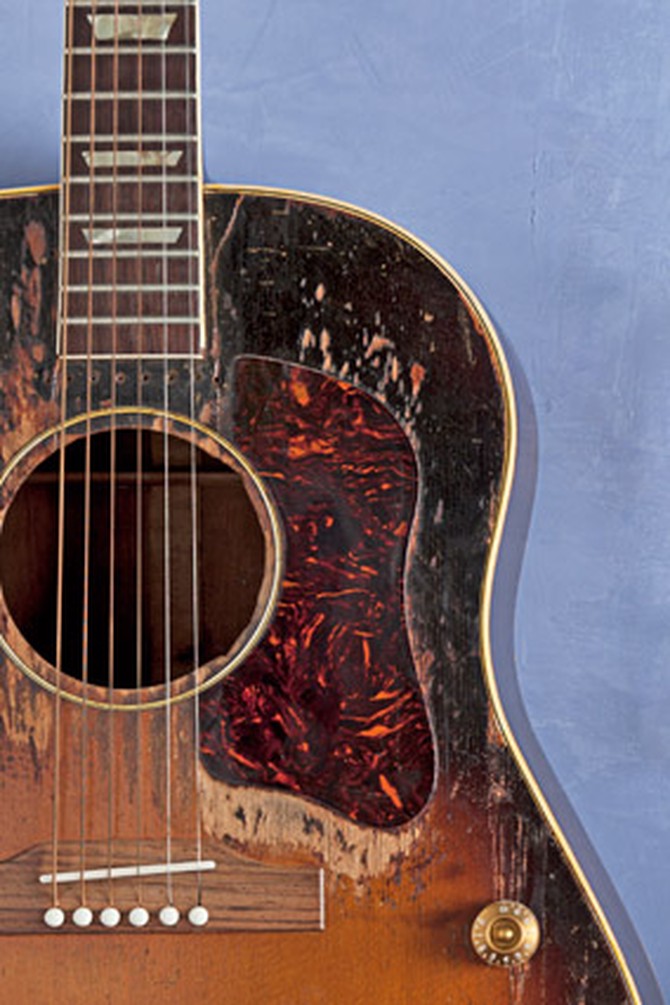
Photo: Burcu Avsar
The guitar I used to play live with—for years it was my old faithful—is a Gibson J-160, which dates probably to about 1954. It's a classic, a great vintage find that I bought used. I took it along when I went on tour with a few musician friends in 1999. One afternoon during that trip, the four of us were driving the van from Chicago to Ann Arbor for a show and I wanted to get some sleep. I lay down across one of the bench seats and thought, It's going to be hard to sleep with this seat belt on. But I put it on anyway, and dozed off. And then I woke to this massive impact, and the sense that the van was floating. There was another impact, and then we started to roll. The glass was smashing out of the windows and dust and dirt was flying all over the place. I felt myself start to slide off the seat, and I had this awful sense that I was going to get thrown halfway out of the van and then get crushed when it rolled again. I remember thinking, "It's over." Finally we came to rest—upright, thank God. My foot was sticking out of the window, and the seat belt was loose around my waist. I was cut from the flying glass. I got out of the car and threw up. We were all in terrible shock. One of my bandmates said, "Are we dead?" I saw my guitar, which had been in a soft case, lying on the road, and picked it up. It was just a bag of splinters. I'd been through some tough things in my life, and I'd always felt so haunted by them. I'd struggled with depression and anxiety for most of my life. As we were being taken to the hospital, I worried that this trauma was going to trigger a state of anxiety I wouldn't be able to manage. But then I called my husband. The first thing I said was, "We're okay." Then I told the story. And he immediately accepted how bad it had been. I understood then that we all need a witness to the difficult things we go through. When something awful happens to you and people tell you it wasn't so bad or that it's time to get over it, the trauma becomes doubly awful, because not only do you have to deal with the pain of the thing itself, you also have to feel like you're crazy for feeling it. For someone to just say, "Wow, that must've been hard for you" makes all the difference. That's how you heal. Which I managed to do—and amazingly, so did my guitar. Funnily enough, the world's foremost guitar repairman happens to live in Ann Arbor, and six weeks after the accident, he shipped it back to me. It sounded better than it ever had.
—Aimee Mann, singer-songwriter
—Aimee Mann, singer-songwriter
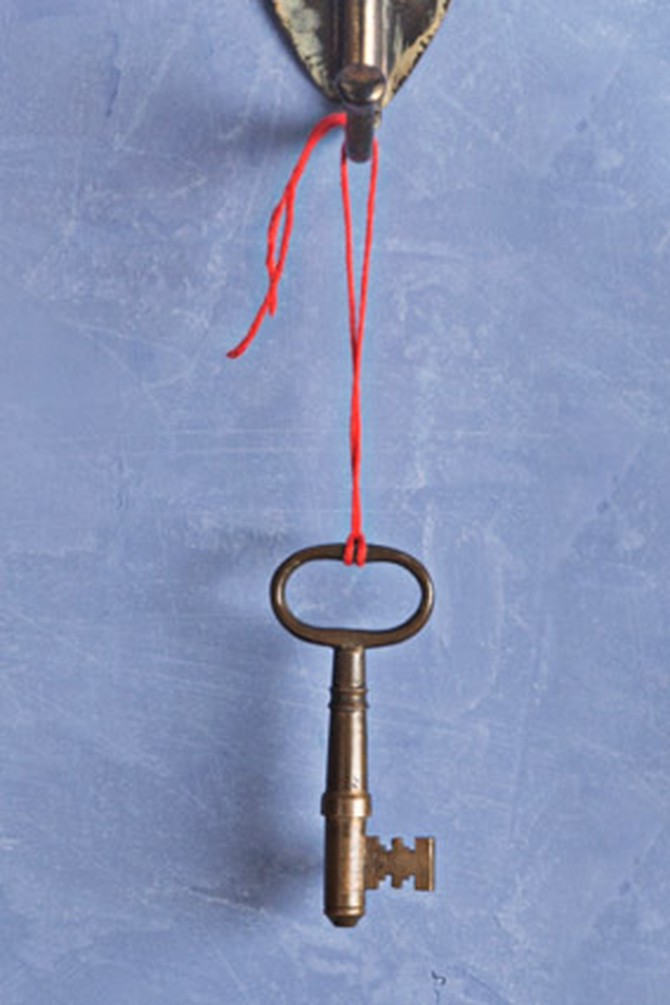
Photo: Burcu Avsar
All children are on a journey from childhood to adulthood, but there's an equally momentous journey that every parent must take. Your children train you in their care, and just when you get the hang of sacrificing for them, of protecting them, of cutting out whatever you need to cut out of your life to give them your full attention, they become teenagers and pull away from you. It comes as a heart-stopping shock. Or at least, it did for me. When my first son began to show signs of the rude fact that he would indeed grow up, I did some research to better understand how teenagers begin to assert their identities. I found a book by the poet Robert Bly called Iron John, which says that a boy must "steal the key from beneath his mother's pillow" to become a man. A child has to reclaim himself from you, to say thanks for sheltering me and caring for my soul all these years, but now I have to be the master of my destiny. (Of course, they never say it so nicely.) When it comes time for the parent to lift her wing and let the birds fly, if she puts feelings of guilt or shame or fear onto the kid—which we all do, and I did my share of it—they have to push back. In fact, the push is what helps them break free. I have three sons, all in their 30s now, and each stole the key in different ways. My oldest was a careful fellow; he didn't test me the way the younger two did. They were much wilder customers. But in each case, letting go felt like an impossible task, because it flew in the face of everything I'd been trained for. The best I could do was try to remember each time that it was my loss to feel and work through, not my son's. I had a journey to take, and so did he; we had the same journey for many years and now they had to separate. When I was visiting my parents' house during my sons' teenage years, I found an old key and asked if I could have it. (I don't know that I've ever quite "stolen the key" from my mother, but that's another story.) For years I kept the key on my desk, and when things got tough and I felt the grief of letting my children go, or things got crazy as they always do with teenagers, it would remind me to have faith, to trust them, and to get out of their way as they became the men they were meant to be.
—Elizabeth Lesser, cofounder and senior advisor, Omega Institute
—Elizabeth Lesser, cofounder and senior advisor, Omega Institute
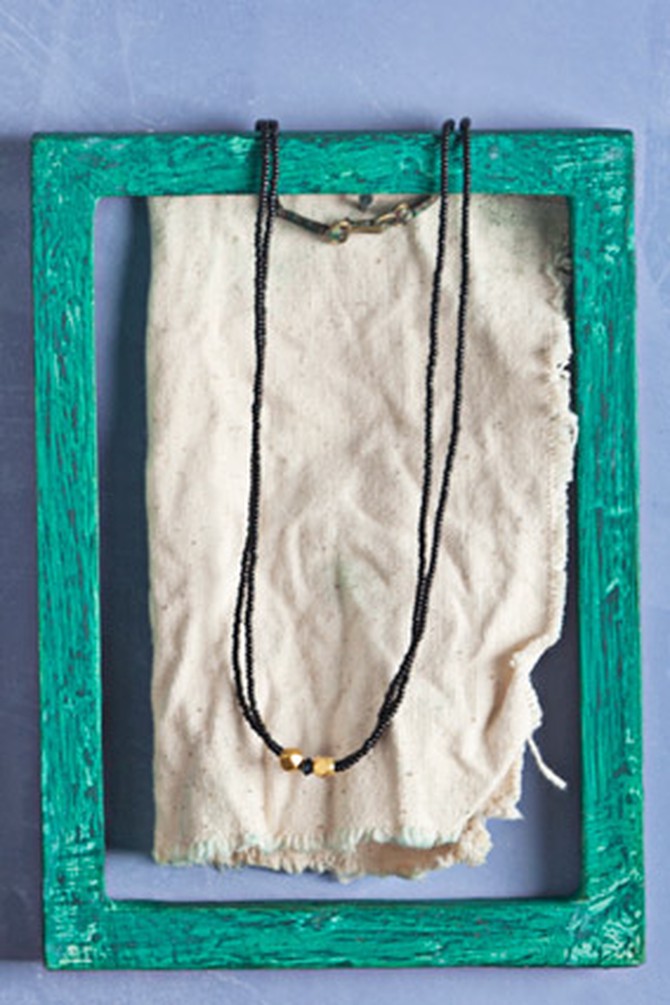
Photo: Burcu Avsar
I received this necklace as a gift about 25 years ago, on a trip to India. I'd gone to visit a good friend who lived on an ashram, where we helped out in the kitchen for about a month. I was at the beginning my career as a chef—I'd spent a year training in the south of France—and this was completely different from any cooking experience I'd had. When I say we worked in the kitchen, I mean we squatted around a stone block with a fire underneath it, and helped eight women grind spices and make naan and paratha. It was really rustic. But it was magical. We'd get up at 5 in the morning and make a big pot of tea before the produce and buffalo milk arrived by bicycle. Then we'd sit in a group and the women would joke and laugh as we prepped vegetables and made curry pastes, yogurt, and ghee. I couldn't understand a word, but they were so warm and welcoming. Sometimes they'd take me into town and fix me up with all these beautiful cottons and pretty colored bangles. We developed a wonderful relationship without ever speaking a word. When it was time for me to head home, they presented me with the necklace, and I felt like they were asking that I not forget them. I haven't. Not only have I gone back to visit them at the ashram five times in the years since, but I've never forgotten what they taught me. Meeting these women changed the way I cook. My palate became more eclectic. I started focusing on stronger flavors like turmeric, curry, and tamarind, and on the simple dishes people eat around the world. I even put a tandoori oven in one of my first restaurants. But cooking with them also showed me how we can communicate with food, regardless of what language we speak. Whenever I see the necklace, I realize how important that time was for me. Being there opened my eyes to the world.
—Susan Feniger, chef and author of Susan Feniger's Street Food (Clarkson Potter)
—Susan Feniger, chef and author of Susan Feniger's Street Food (Clarkson Potter)
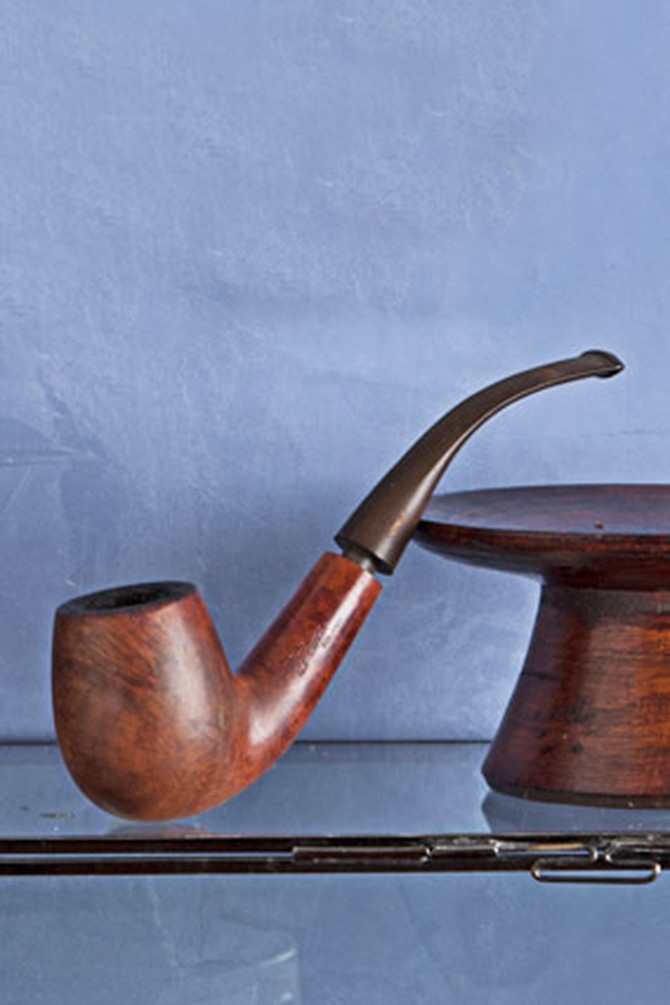
Photo: Burcu Avsar
Recently I was going through some boxes that had belonged to my father. Among his old papers and cards, I found his pipe. There is no object more emblematic of him. In every photo, he's pointing with it, or has it in his mouth. There was even a documentary made about his career—he was a respected diplomat and a beloved professor—entitled A Man With a Pipe. Finding it quite undid me. I was the firstborn in my family, and my father and I were always very close. He was everything a parent should be, a warm and loving father and a fine human being. (He was an unusually buttoned-up man, however; when late in his life he moved to Colorado, he took up fishing, which he only did in a coat and tie, and skiing, which he did in an overcoat.) Being European, he was also very strict. He expected a great deal from us, and I credit everything I've accomplished to the desire to live up to those expectations. While it's impossible to contain all of one person in one object, when I found his pipe I felt him nearer than I had in years. My journey has been a long one, and I feel that one of the most important things I've done in my life is to remain ever grateful. My father had an amazing career, but there were so many other things he might have accomplished had he not lived through what he did—our family was forced from Czechoslovakia during the Nazi occupation and then again during the Communist regime, which is when we came to America. Holding my father's pipe and thinking of his life, I realized how many things I'd done that were modeled on his example, and that I hoped would in some way fulfill the things he would have wanted to do himself. My career, my life, is a tribute to him. I look at his pipe and see his journey, but I also see my own.
—Madeleine Albright, former secretary of state and author of Prague Winter (Harper)
—Madeleine Albright, former secretary of state and author of Prague Winter (Harper)
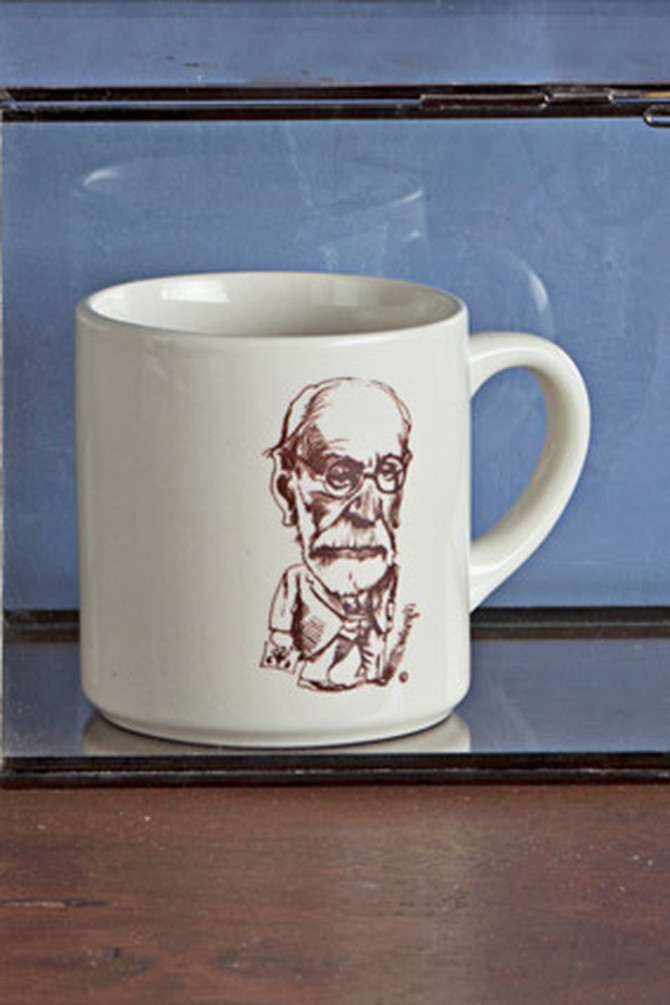
Photo: Burcu Avsar
A decade ago, I stole this mug—which features a caricature of Sigmund Freud—from my Freudian analyst. I drank tea from the mug each time I visited her office, where she said very little, only coughed occasionally from her seat behind me. She was elegant, with long white hair and a weathered face. She let no personal information slip. I decided she'd led a perfect life. On my way out, I would glance in the window of her Subaru and hungrily note the clutter of her grandchildren's toys and car seats.
I was nearly 30. I'd written a successful novel, and was working on another that nobody liked. I thought it was darkly hilarious. My editor did not. I had recently rejected a marriage proposal from my sane and handsome boyfriend, unable to imagine myself living the charmed life he seemed to offer. All I could see ahead was divorce, alcoholism, madness—my family inheritance. I explained this to my therapist, who said nothing. Sometimes I wondered if she was listening. Once, I whipped my head around, hoping to catch her asleep.
"Why did you just turn to look at me?" she asked.
"To see if you were awake."
"Do you think what you're telling me is uninteresting?"
I shrugged.
After my session one afternoon, I carried the Freud mug to my car and felt a sting of shame. Before each visit I told myself to take it back. I never did. Spring came, and the second novel was published to mostly terrible reviews. I spent a weekend weeping, then dragged myself to the therapist's office, wondering aloud why I'd written such a strange and offensive work. She asked me if I'd liked my book. I said I didn't know yet. When I moved to another city, we parted ways. As I left her office for the last time I was gripped by a grief so fierce I had to steady myself on a fence. And then I lurched forward into a new life. I published another book, to better reviews. I married and had children and bought a Subaru, which is now cluttered with toys and car seats.
For years I regarded that second novel as my abominable mistake. But Freud said that there are no mistakes. One night not long ago, after the children finally fell asleep, I dared to look at it again. It read to me like something created out of fearless conviction. I finished it in one sitting, happier with it than with anything else I'd written. I keep the mug because it reminds me of my therapist, who suggested, in her own delicate way, that I learn to privilege my own voice first rather than living and dying on the opinions of others. And it's her cup that accompanies me to the blank page each day, her cup that I drink from as I work, her cup that reminds me to be brave.
—Danzy Senna, author of You Are Free (Riverhead)
Next: What's the secret to a happy life?
I was nearly 30. I'd written a successful novel, and was working on another that nobody liked. I thought it was darkly hilarious. My editor did not. I had recently rejected a marriage proposal from my sane and handsome boyfriend, unable to imagine myself living the charmed life he seemed to offer. All I could see ahead was divorce, alcoholism, madness—my family inheritance. I explained this to my therapist, who said nothing. Sometimes I wondered if she was listening. Once, I whipped my head around, hoping to catch her asleep.
"Why did you just turn to look at me?" she asked.
"To see if you were awake."
"Do you think what you're telling me is uninteresting?"
I shrugged.
After my session one afternoon, I carried the Freud mug to my car and felt a sting of shame. Before each visit I told myself to take it back. I never did. Spring came, and the second novel was published to mostly terrible reviews. I spent a weekend weeping, then dragged myself to the therapist's office, wondering aloud why I'd written such a strange and offensive work. She asked me if I'd liked my book. I said I didn't know yet. When I moved to another city, we parted ways. As I left her office for the last time I was gripped by a grief so fierce I had to steady myself on a fence. And then I lurched forward into a new life. I published another book, to better reviews. I married and had children and bought a Subaru, which is now cluttered with toys and car seats.
For years I regarded that second novel as my abominable mistake. But Freud said that there are no mistakes. One night not long ago, after the children finally fell asleep, I dared to look at it again. It read to me like something created out of fearless conviction. I finished it in one sitting, happier with it than with anything else I'd written. I keep the mug because it reminds me of my therapist, who suggested, in her own delicate way, that I learn to privilege my own voice first rather than living and dying on the opinions of others. And it's her cup that accompanies me to the blank page each day, her cup that I drink from as I work, her cup that reminds me to be brave.
—Danzy Senna, author of You Are Free (Riverhead)
Next: What's the secret to a happy life?
From the June 2012 issue of O, The Oprah Magazine

